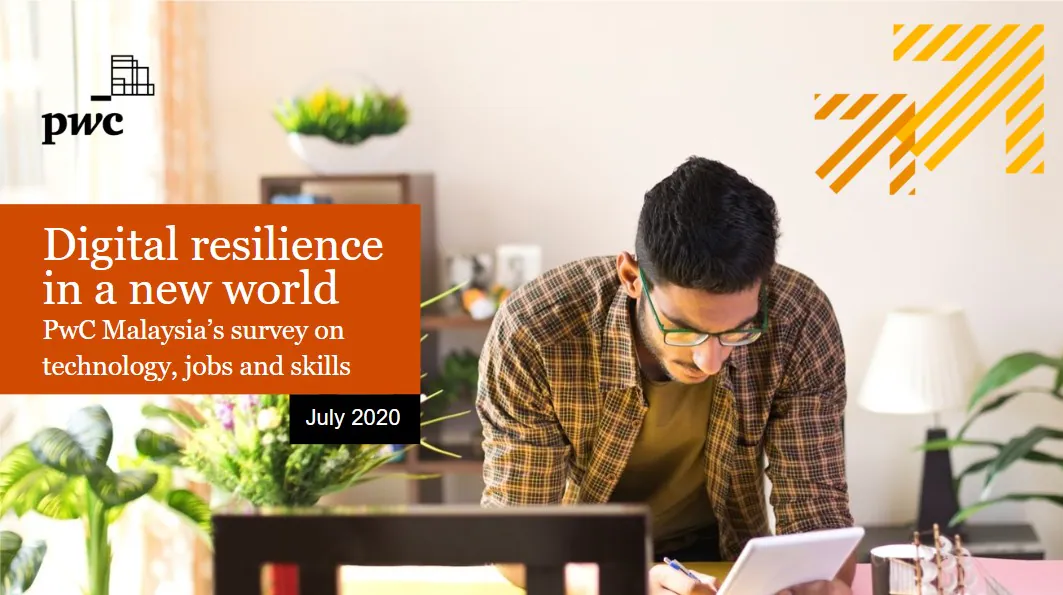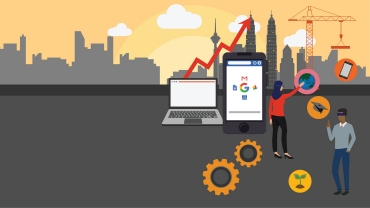
Contributing through our New world. New skills programme.
Annual Report : Clients | Firm | People
Digital resilience in a new world
With COVID-19 accelerating the adoption of technology, we explored how Malaysians felt about its impact on jobs and skills. These insights, we felt, were important for organisations to see how the workforce was coping, and what measures could be implemented as a response.
We carried out a survey from April to May 2020 while the country was under our first Movement Control Order (MCO) and Conditional Movement Control Order (CMCO). In July 2020, we published the results in a report called ‘Digital resilience in a new world’.*
We found that many respondents agreed that technology was changing the future of jobs, and while 78% of respondents were optimistic about automation bringing more opportunities than risks, 34% were concerned about automation putting jobs at risk. Our findings also showed that many respondents were of the same opinion that digital skills are key to better job prospects, and that many are willing to learn if given the chance.
At the time the survey was conducted, organisations were still adjusting to remote working, so perhaps unsurprisingly, we found that employees were in need of more support in the form of infrastructure/technological tools and a change in organisational culture to be able to work effectively away from the office.
As these are workforce and upskilling/reskilling challenges we knew the nation was facing, we brought these findings to our clients in the private and public sectors, sharing our recommendations to address the gaps.
We believe that to build a digitally-ready workforce, organisations need to:
Assess current and future business needs, and identify skills gaps and mismatches
Build a future-proof skills strategy
Lay the cultural foundation
(e.g. by inspiring citizen-led innovation and nurturing mental wellbeing)
Develop and implement upskilling immediately, and ensure it is a business priority
Evaluate return on investment
Hopes and Fears survey 2021: Malaysia report
Following the positive response from our ‘Digital resilience in a new world’ report, we released a local version of PwC’s Hopes and Fears survey 2021** in April 2021. The report mainly explored how Malaysians have adapted to our digital world amid the pandemic, and their thoughts on the future of work.
A year of working remotely showed some improvements in some areas. For example, more than half of our local respondents reported their digital skills improved since the pandemic began. We also saw a slight increase in the number of respondents (43% of respondents) who said they’re provided with ‘many opportunities’ to improve their digital skills outside their normal duties.
However, our findings also indicated that Malaysians were in danger of burnout, with only a small number (28%) saying they can disconnect from work outside working hours. Well-being cannot be neglected, and this point was emphasised through several recommendations that we hoped would spark a dialogue, and change the way organisations approach achieving productivity.
With the pandemic continuing to bring about workforce challenges, it has only strengthened our resolve and commitment to help Malaysians adapt to the future of work. We recommend organisations:
Customise their upskilling and reskilling programmes
Minimise barriers
(e.g. ensuring employees have the relevant tools to learn in their own time)
Empower employees to work anywhere
Pay closer attention to employee well-being
Build a purpose-driven organisation
*Our 2020 report ‘Digital resilience in a new world’ was an independent report prepared by PwC Malaysia as a local version of PwC’s Global ‘Upskilling Hopes and Fears 2019’ report.
**Our 2021 report 'Hopes and Fears Survey' can be considered a follow-up thought leadership to the 'Digital resilience in a new world' report. Responses were taken from the global survey commissioned by the PwC global network, of which Malaysia was one of the 19 participating territories.
Contact us




















